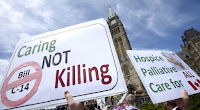Alex Schadenberg
Executive Director, Euthanasia Prevention Coalition
Alzheimer's is a terrible condition. Research, treatment and care is needed for people with Alzheimer's and their families. The Alzheimer's Association announced that they have ended their agreement with an assisted suicide group.
Contact the Alzheimer's Association at: media@alz.org and thank them that they have recognized that:
Assisted suicide does not maximize quality care and support.
A world without Alzheimer's must not be achieved by killing people with Alzheimer's
Assisted
suicide is the ultimate form of abandonment. People with Alzheimer's
deserve to be cared for and upheld as a human person deserving of life
with dignity.
 The Alzheimer's Association sent out a media release on January 29 stating that they have ended their agreement with Compassion & Choices. Here is the release:
The Alzheimer's Association sent out a media release on January 29 stating that they have ended their agreement with Compassion & Choices. Here is the release:
January 29, 2023
Email: media@alz.org
Chicago, January 29, 2023 — In an effort to provide information and resources about Alzheimer’s disease, the Alzheimer’s Association entered into an agreement to provide education and awareness information to Compassion & Choices, but failed to do appropriate due diligence. Their values are inconsistent with those of the Association. We deeply regret our mistake, have begun the termination of the relationship, and apologize to all of the families we support who were hurt or disappointed. Additionally, we are reviewing our process for all agreements including those that are focused on the sharing of educational information.
As a patient advocacy group and evidence-based organization, the Alzheimer’s Association stands behind people living with Alzheimer’s, their care partners and their health care providers as they navigate treatment and care choices throughout the continuum of the disease. Research supports a palliative care approach as the highest quality of end-of-life care for individuals with advanced dementia.
About the Alzheimer's Association
The Alzheimer’s Association is a worldwide voluntary health organization dedicated to Alzheimer’s care, support and research. Our mission is to lead the way to end Alzheimer's and all other dementia — by accelerating global research, driving risk reduction and early detection, and maximizing quality care and support. Our vision is a world without Alzheimer's and all other dementia®. Visit alz.org or call 800.272.3900.
The Alzheimer's Society has recognized that promoting assisted suicide denies their clients the human and dignified care that they need and deserve. Killing is not caring.



























